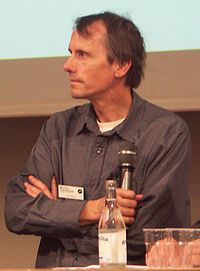Mark Mattson
Mark Mattson | |
|---|---|
 Mark Mattson in 2009. | |
| Born | Mark P. Mattson 1957 Rochester, Minnesota |
| Nationality | American |
| Alma mater |
|
| Spouse(s) |
|
| Scientific career | |
| Fields |
|
| Institutions |
|
Mark P. Mattson is a Professor of Neuroscience at Johns Hopkins University.[1] He is the former Chief of the Laboratory of Neurosciences at the National Institute on Aging Intramural Research Program of the National Institute on Aging.[2]
Mattson has done research on intermittent fasting.[3] The National Institute of Health considers him "one of the world’s top experts on the potential cognitive and physical health benefits of intermittent fasting".[2][4]
Awards and recognition[]
Mattson was elected a Fellow of the American Association for the Advancement of Science for research revealing the cellular mechanisms involved in neural plasticity — the ability of neurons to adapt during processes like learning or injury — and development of neurodegenerative disorders. He is the recipient of the Alzheimer's Association Zenith Award, the Metropolitan Life Foundation Medical Research Award, and the Santiago Grisolia Chair Prize. He was as the founding Editor and Editor-in-Chief of NeuroMolecular Medicine and Ageing Research Reviews.[2]
On June 3, 2019, an International Symposium, "Pathways Towards and Away from Brain Health," was held to honor him on his retirement from the NIH.[2]
Selected publications[]
- Furukawa K, Barger SW, Blalock E, Mattson MP (1996). "Activation of K+ channels and suppression of neuronal activity by secreted -amyloid precursor protein". Nature. 379 (6560): 74–8. doi:10.1038/379074a0. PMID 8538744. S2CID 25513373.
- Mattson MP (August 2004). "Pathways towards and away from Alzheimer's disease". Nature. 430 (7000): 631–9. Bibcode:2004Natur.430..631M. doi:10.1038/nature02621. PMC 3091392. PMID 15295589.
- Stranahan AM, Mattson MP (2012). "Recruiting adaptive cellular stress responses for successful brain aging". Nat Rev Neurosci. 13 (3): 209–16. doi:10.1038/nrn3151. PMC 4084510. PMID 22251954.
- Cheng A, Yang Y, Zhou Y, Maharana C, Lu D, Peng W, Liu Y, Wan R, Marosi K, Misiak M, Bohr VA, Mattson MP (January 2016). "Mitochondrial SIRT3 mediates adaptive responses of neurons to exercise, and metabolic and excitatory challenges". Cell Metab. 23 (1): 128–42. doi:10.1016/j.cmet.2015.10.013. PMC 5141613. PMID 26698917.
- Mattson MP, Moehl K, Ghena N, Schmaedick M, Cheng AE (February 2018). "Intermittent metabolic switching, neuroplasticity and brain health". Nat Rev Neurosci. 19 (26): 63–80. doi:10.1038/nrn.2017.156. PMC 5913738. PMID 22251954.
- de Cabo RE, Mattson MP (December 26, 2019). "Effects of intermittent fasting on health, aging, and disease". N Engl J Med. 381 (26): 2541–51. doi:10.1056/NEJMra1905136. PMID 31881139.
References[]
- ^ Mark P. Mattson. Johns Hopkins School of Medicine.
- ^ Jump up to: a b c d "International Symposium to Honor Pioneer in Neuroscience and Fasting". National Institute on Aging. May 29, 2019. Retrieved January 11, 2020.
one of the world’s top experts on the potential cognitive and physical health benefits of intermittent fasting
- ^ "Fasting power: Can going without food really make you healthier?". New Scientist.
- ^ "Fasting Guide". Thursday, October 1, 2020
External links[]
- 1957 births
- American neuroscientists
- Colorado State University alumni
- Fasting researchers
- Johns Hopkins University faculty
- Living people
- University of Iowa alumni